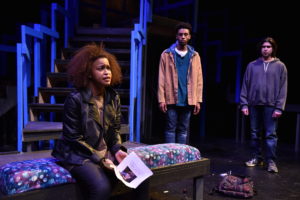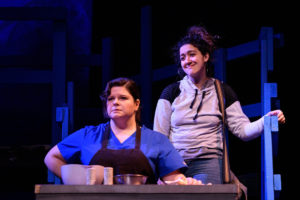
 Opening night of the 33rd Annual Young Playwrights Festival (YPF) was held at the Courtyard Theatre at Columbia College amid another early-January production: howling winds and massive surf off Lake Michigan.
Opening night of the 33rd Annual Young Playwrights Festival (YPF) was held at the Courtyard Theatre at Columbia College amid another early-January production: howling winds and massive surf off Lake Michigan.
The evening doubled as awards night, featuring the three winners of the annual Chicago high school playwriting contest and their prize-winning entries:
— “Public in Private” by Angelina Davila – Taft High School
— “Clause 42” by Henry Williams – Lane Tech Academy
— “Cobalt” by Reba Brennan – Senn High School
Each playwright was introduced via a video autobiography, immediately followed by a presentation of their one-act play, performed by actors from Pegasus Theatre Chicago and directed by professionals Juan Ramirez, Jason A. Fleece, and Ilesa Duncan respectively.
By watching each of these three short plays (roughly 30-35 minutes in length), the audience gains a handle on some of the issues that young adults grapple with and how they learn to confront or resolve them in the face of an imperfect and often unfair world.
In the first play “Public in Private”, Lucie Ochoa (Tina El Gamal), a high school upperclassman, has dreams of becoming an artist, only to have these dashed by her mother (Sarah Schol), who feels that college is only important for those entering professions like law and medicine. She asks (and I paraphrase), “Why else go to college? How can you make money doing art?” Then too, Lucie’s 15-year-old brother Lonnie (Peter Gertas) is deeply concerned that his girlfriend Annie (Destiny Strothers) might be pregnant. Lucie, the wise older sister, then becomes involved in giving advice to both. When family problems, negative messages, and discouraging thoughts echo in Lucie’s brain during an interview with a prestigious art school, she loses concentration and fails to present herself and her portfolio in a favorable manner.
In the third play “Cobalt”, once again, the story has to do with dysfunctional family dynamics. This time, Vee, an 18-year-old girl (Destiny Strothers), and her mother Tess (Izis Mollinedo) argue about whether Vee is lying when she states that she has stayed late at school to study. While we never learn what exactly may have happened, what becomes evident is that the mother gets drunk most of the time—and Vee wants to remove herself from her abusive and uncaring behavior. So after their latest quarrel, she runs off to her childhood friend Declan (Austyn Williams), who allows her to sleep on his living room couch, despite the fact that his male companion Camden (Peter Gertas) has his reservations. It is only when their friend Felix (Sebastian Summers) comes on the scene that the subject of Vee’s estrangement from her mother is finally broached. Then she realizes that maybe her living situation isn’t so bad after all, compared to Felix’s. She has a house to return to, whereas his father regularly beats and sexually abuses him.
In both of these female-centered dramas, the main character deals with issues of self-reliance. She makes some compromise between desiring affection and security within the strictures of home and family versus striking out and gaining some measure of independence.
Sandwiched in between is “Clause 42”, a largely comedic and nimble take on religion, death, and the afterlife; about the meaning of worship and the forms it can take. Of the three plays, this is the only one that deals with otherworldly phenomena rather than being based on everyday concrete reality. It is also the only play where the main character is male—and not a teenager but a grown adult. When George (Peter Gertas) finds himself living in the afterlife, his accuser (Sarah Schol) proclaims that he is deserving of eternal damnation, according to the god Xezyith (Ling Ling McElrath). But George has no intention of kowtowing to a god of somebody else’s understanding or to a cultish religion that he had never heard of. He cannot fathom any higher power judging him on ridiculous expectations for his behavior, such as eating eggs on Thursdays—or was it not eating eggs? Most importantly, he stands up for his own belief system (or lack thereof), based on his free will and personal experiences with his previous life on earth.
At the end of the three presentations, Ilesa Duncan, the executive and producing director of Pegasus Theatre, took the microphone to introduce the other directors Ramirez and Fleece, as well as the event organizers and all those responsible for making the festival possible at Columbia College. Then she acknowledged Tom Tresser, the founder of the competition, and explained a bit about those who judged the student entries. Twenty-two scripts made it to the final round, out of approximately 500 submitted this past year. Finalists in earlier contest rounds were invited to rewrite and resubmit their work with the assistance of several mentoring theatre artists. The evening’s program was concluded with the handing out of prizes and plaques to the three winners, seven remaining finalists, and twelve honorable mentions.
My guest fell in love with these talented high school playwrights. Referring to each of their works, he remarked, “I couldn’t have thought of these things. I certainly couldn’t have written them down as they did.” He was especially enamored by the idea of the festival and the fact that all of these students were being honored for their fine accomplishments by their teachers, parents, and peers. My own thinking was along slightly different lines. These are young adults who have either gone through or have imagined their share of troubles, which may have been part and parcel of the lives of friends, relatives, or acquaintances. By standing outside of themselves, examining their own inner voice, and establishing meaningful and believable reactions to likely situations, these aspiring Becketts have subsequently produced expressive and dynamic works of theatre to share with the world. And through the course of writing and rewriting, each is learning how to hone their craft, which will only improve over time.
The 33rd Annual Young Playwrights Festival is ongoing through January 25, 2020, at The Courtyard Theatre in The Getz Theater Center at Columbia College, 72 E. 11th Street, Chicago.
Performances take place on Thursdays and Fridays at 7:30 p.m. and Saturdays at 2:00 p.m.
Group performances are available Wednesdays at 7:30 p.m. and at weekday matinee performances Tuesdays through Fridays at 10:00 a.m.; contact the box office for group matinee and school performance availability.
Tickets are $18 for students, $25 for seniors and $30 for general admission and are available at www.Pegasustheatrechicago.org or by phone at 773-878-8864.
phots Michael Courier






More Stories
“Survivors” reviewed by Julia W. Rath
“Prayer for the French Republic” reviewed by Julia W. Rath ( and another by Paul Lisnek)
“Obliteration” reviewed by Mark Reinecke